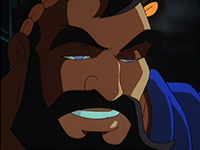|
 It
is much easier to fall short of intentions or expectations than to exceed
them; how refreshing, then, to run across the occasional story that is
better than it has any right to be. The premise of "Fire From Olympus,"
that a shipping magnate several walnuts short in his baklava should dress
up like Zeus and throw thunderbolts around, seems dumb beyond belief.
To describe selected scenes, like Batman's fight with the Hydra, would
only add to the impression of low-grade corn. So why does it work? It
is much easier to fall short of intentions or expectations than to exceed
them; how refreshing, then, to run across the occasional story that is
better than it has any right to be. The premise of "Fire From Olympus,"
that a shipping magnate several walnuts short in his baklava should dress
up like Zeus and throw thunderbolts around, seems dumb beyond belief.
To describe selected scenes, like Batman's fight with the Hydra, would
only add to the impression of low-grade corn. So why does it work?
Partly, I think,
because Maximillian believes in his world so thoroughly that we wonder
if it is he that's insane or we who are misguided. His delusions, after
all, do not incapacitate him or interfere with his plans, hitherto successful.
He embraces Batman as his "brother Hades," while stoutly resisting
his interference; as "Zeus" he does not seem the least bit fazed
by the obviously technological underpinnings of his power. The result
leaves us feeling like we're stuck in that Escher house where the people
live at 90-degree angles to each other: Perhaps Maxie's not really mad,
perhaps he just sees and interacts with the world in a strikingly different
but no less rational way than we do.
The tension between
his attitudes and those of his minions is another source of unexpected
pleasure. Instead of henchmen who buy into the scheme and dress up accordingly,
it gives us lackeys who are either amused or mortified by the boss' delusions.
The conceptual and attitudinal miss is so great it sometimes feels like
screwball comedy: Maxie and Clio thoroughly exasperate each other because
neither will see the world as the other sees it—each one thinks the
other is being willfully perverse.
The episode also
manages to recapture some of the charm associated with the early comic
books—or, at least, it lulls us into a mood that will take innocent
pleasure in the goofiest of situations. Let's be honest: a lot of Batman's
early adventures were pretty risible (even when they tried to be dark),
and it's easy to cop a snarky attitude toward them. But that's just the
kind of attitude Clio and Stavros adopt in the face of the ridiculous
plot they're trapped in. This has the effect of disarming our own skepticism
toward the story: we can no longer feel knowing and superior to the characters
in the story when they're already acting knowing and superior to it, and
when they get stopped dead in their tracks by Maxie's earnestness we're
stopped dead too. When an episode anticipates and bamboozles our suspicions
as thoroughly as this one does, there's only one thing we poor, bemused,
latter-day cynics can do: Sit back and enjoy the ride.
The episode features
a powerful score, too.
|


